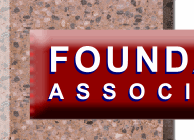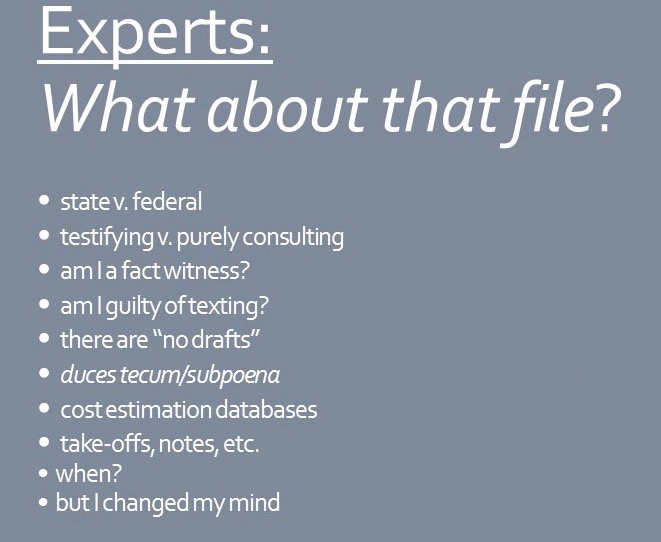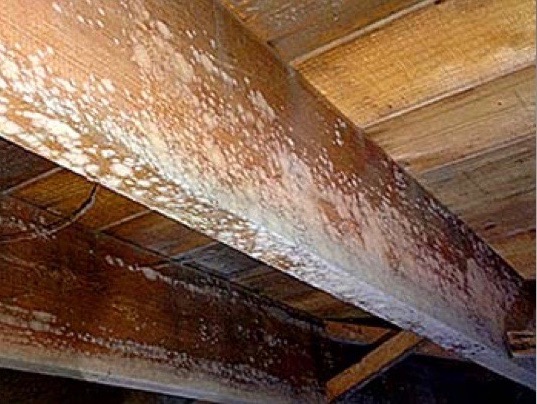

Webmaster: Liz Stansfeld |
Webmaster: Liz Stansfeld |
|
|

APRIL 2006 - Risk Management for Design Professionals
Speaker: John Cahill, Attorney with Hays, McConn, Rice & Pickering, Houston, TX, Tel. (713)-752-8322
PRESENTATION SUMMARY
 To a room of about 55, John Cahill, an attorney with Hays, McConn, Rice & Pickering, who has a law degree from Baylor School of Law in 1984 and who specializes in representing design professions such as architects, engineers and surveyors, gave a presentation entitled, "Risk Management for the Design Professionals."
To a room of about 55, John Cahill, an attorney with Hays, McConn, Rice & Pickering, who has a law degree from Baylor School of Law in 1984 and who specializes in representing design professions such as architects, engineers and surveyors, gave a presentation entitled, "Risk Management for the Design Professionals."
Mr. Cahill started the presentation noting that in recent years, Harris County has swung from a county with more defense wins to one with more plaintiff wins, saying this resulted from obnoxious rhetoric from the tort reform supporters in Texas. He then discussed Certificate of Merits for design professionals, a recent Texas law passed as a result of tort reform.
According to Mr. Cahill, Certificate of Merits were introduced to the State of Texas in September 2003, but the code had loopholes. Then, with HB 1573, effective 31 May 05, the Certificate of Merit code was modified in that:
a) it recognized the firm if registered with the state board, meaning to sue an engineering firm, a separate certificate of merit for the firm is also needed,
b) it does not include landscape architects and interior designers,
c) if there is not a valid certificate of merit, the code now states that the case "shall be dismissed," whereas before it "may be dismissed with prejudice,"
d) the defense can file for dismissal before instead of after the case is tried,
e) the certificate of merit is not required when suing for fees,
f) anyone writing a certificate of merit against an engineer is practicing engineering and therefore must be licensed by the state, and
g) an architect cannot write a certificate of merit against and engineer and vice versa.
Mr. Cahill further said the certificate of merit law still needs certain wording clarified in the courts, especially the meaning of "actively practicing in the same area." He hopes to prove one day that a forensic engineer or architect can never write a certificate of merit against another engineer or architect doing design work.
Mr. Cahill touched on the Deceptive Trade Practices Act (DTPA) saying engineering opinions are exempt from DTPA. i.e., design professionals rendering an opinion should never get sued or if that happens, it will never go to trial unless the design professional intentionally did something wrong. He also advised that engineers should not state in a report that something is "structurally unsafe" unless they plan to promptly report the unsafe condition to the proper authorities. Writing it in a report to the client is not enough.
Mr. Cahill advised not to raise the standard of care by saying in your proposal or on your website something like, "We are the best in the industry." He noted though that you cannot lower the standard of care because the minimums are set by the state boards. Further he said writing contracts with limitation of liabilities occasionally work, but only if you make it stand out (by capitalization, bolding, etc.) and have a specific space for the client to initial it showing that he read and understood it. Mr. Cahill advised not to propose any warranties.
Mr. Cahill said to be sure the contract is not ambiguous and make sure you stay within the scope of the contract, i.e., do not take on additional liability during the project. Give everyone in the firm working on the a project a copy of the contract so they know the limits to work within. Also, do not agree to indemnify your client for anyone's negligence but your own company. Mr. Cahill said the trend in contracts is away from the standard AIA contract. And he said to not sign contracts with arbitration clauses because arbitration typically costs more than trying court cases.
With respect to professional liability insurance, Mr. Cahill noted that when in doubt, ask your insurance broker to review the contract before signing. You could possibly sign away your insurance coverage by raising your standard of care or creating a warranty. Also, he advised not to guarantee that you will maintain professional liability insurance for a specific period of time after the job is over as it is difficult to predict when it becomes to costly to carry insurance.
|



